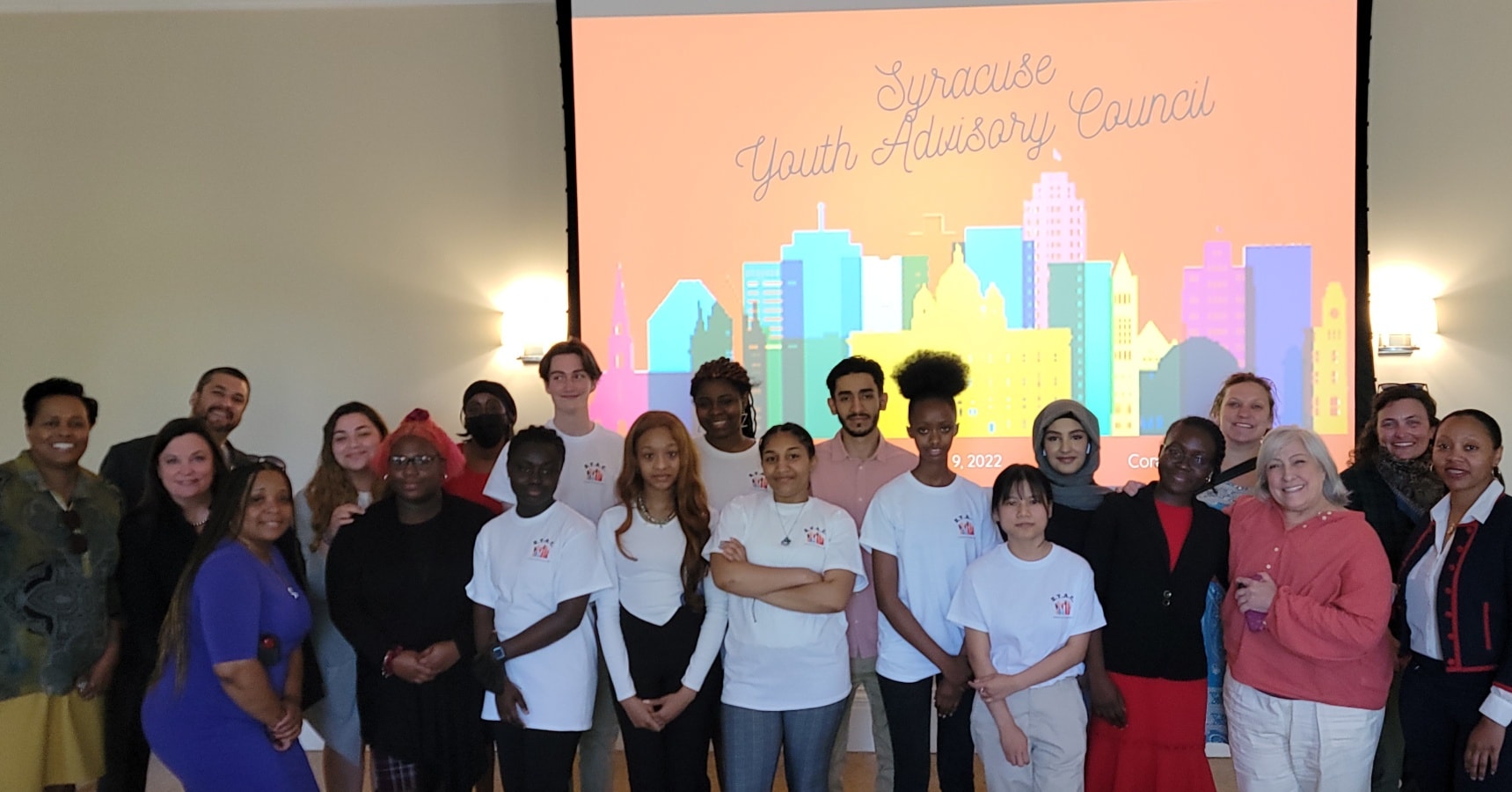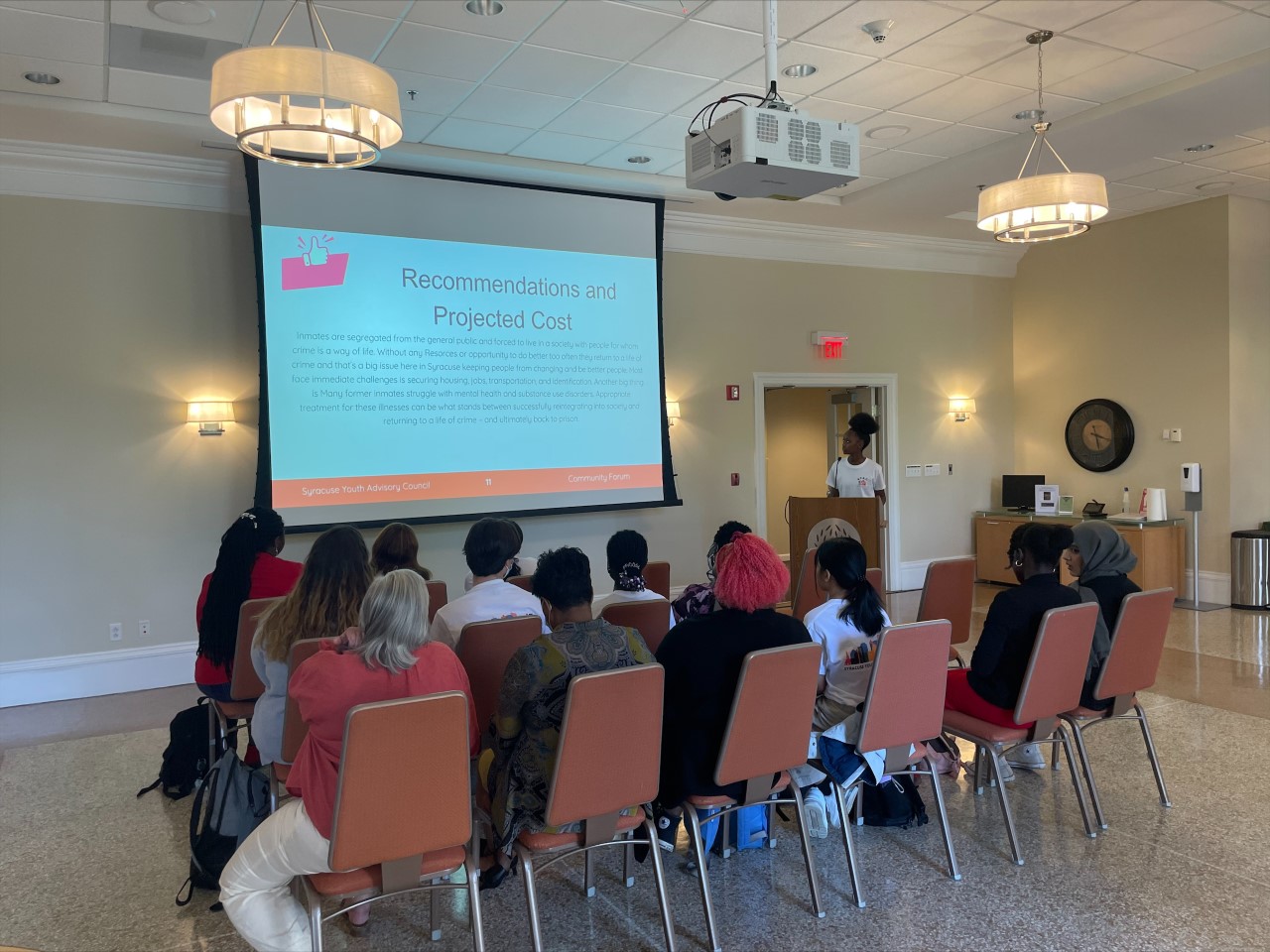High School Students Show Leadership, Civic Readiness on Syracuse Youth Advisory Council
 The City of Syracuse has heard the voice of the youth – well, the Syracuse Youth Advisory Council, at least!
The City of Syracuse has heard the voice of the youth – well, the Syracuse Youth Advisory Council, at least!Featuring more than 20 high school students from all SCSD high schools, the Syracuse Youth Advisory Council (SYAC) encourages youth to engage in community and policy issues of citywide importance and express their voice to policy leaders within city government.
In monthly meetings, students learned about the history of Syracuse, as well as what happens at City Hall. They shared their thoughts on issues impacting Syracuse today and learned how policy comes about and how to take informed civic action. They even engaged with Common Council Members through feedback sessions!
Corcoran senior Blessing Jenkins said she has enjoyed the opportunity to meet the Mayor and Common Council members, noting that the Youth Advisory Council has helped her see her city and her role in a new light.
“I thought it would be a fun and exciting way to help the community and solve multiple issues that myself, friends, and family saw around Syracuse,” she explained. “I loved the experience! We drove around Syracuse sight-seeing and pointing out problems that we noticed. I learned how to navigate City Hall. This program has greatly impacted me in so many ways. It is deeply important for these programs to exist that will actually help students be in contact with officials and be able to change the community. My participation has shown me that my voice and opinion actually matter – that I can make a difference in my community. It has also led to me wanting to be more involved in the community, whether that be through food and clothing drives, picking up litter, or maybe even attending another Common Council meeting!”
Classmate Zaniyhia Escobar agreed, noting that her participation in the SYAC made her feel like she has the potential to make a real difference in the community.
“I wanted to see if I can make a real difference in my community,” Zaniyhia explained. “I wanted to learn about problems, provide input and see if I can help produce some solutions for problems in the neighborhood where my friends and I grew up.”
Zaniyhia described touring different areas of the City with SYAC and discussing the challenges that each area faced.
“It was interesting to see how different the different neighborhoods are and the different problems each ones faces,” she said. “Personally, I have done a little bit of volunteering in different neighborhoods, and I feel immensely proud of everything I am doing to make a change. Being part of the SYAC has made me understand the struggles that the city is facing. It makes me think I can help. I am making connections to people in my city and talking to people in power. It has helped bridge the gap between people in power and young adults. It’s let us know that our opinions matter to them and they want our input. The connections we made have shown me that we as youth can talk to people in power and be heard, not ignored.”

ITC junior Abdullah Ghanem shared similar sentiments, noting that youth often notice issues or have ideas for solutions that adults may not.
“Programs such as SYAC are extremely important to let students know that their voices are heard within their communities,” Abdullah shared. “Often times, the ideas of students are overlooked, leading many students to feel that they have no input within their own communities. But it can be very beneficial to have students’ perspectives on community issues, because students are often able to recognize issues within their communities, that only they are affected by, that adults cannot.”
Abdullah said he was interested in the opportunity to influence change in the City – and he was pleased to also learn about what happens within local government, and how that ties into larger government bodies like the State and Federal governments.
“My participation in this program will impact me moving forward because I now know about so many of the details and different parts of my local government,” he said. “I have learned how I as a citizen can influence and create change within my city and even on a larger scale. This program has also given me skills and experiences that will be beneficial to me in any part of life, including helping me to better my communication skills, leadership skills, and networking skills.”
At the end of the year, SYAC participants were offered the opportunity to create a presentation for Common Councilors about an issue of their choice – including research and possible solutions.
Abdullah’s group focused on stressing the importance of renovating the athletic courts at Roesler Park, located near ITC.
“Roesler Park has been neglected for many years and is currently in very poor condition,” he explained. “The park is heavily utilized by the ITC Physical Education Department and the local community, and it will soon be used by a new high school being built near ITC. Because so many people are heavily dependent on it and it is in such bad shape, we see a need for the renovation.”
“My presentation was about the need to have daycares in schools for those who encounter teen pregnancy,” Blessing shared. “I selected this topic because I know multiple teen moms and they express the struggle of not having someone to watch their child and how daycares are so expensive. For many, they end up missing out on school or even dropping out altogether. I think it would be a great idea to reintroduce the idea of daycare offerings into schools.”
Zaniyhia’s project centered around creating a shelter or center for homeless youth through early twenties.
“The population of homeless teens has increased and there are many reasons,” she shared. “Parents can throw a teenager out or kids can run away. I feel these kids should have a fair chance in life and should have somewhere they can go that where they feel like they can be whatever they want to be when they are older.”
The Syracuse Youth Advisory Council curriculum is also aligned to the Seal of Civic Readiness Capstone Project. By completing all the criteria of the SYAC, students achieve four points toward the Seal of Civic Readiness, which students can later claim as an official pathway to graduation.
Congratulations to the student leaders who served on the 2022 Syracuse Youth Advisory Council – we are proud of your leadership and appreciate your ideas for improving the City of Syracuse!


